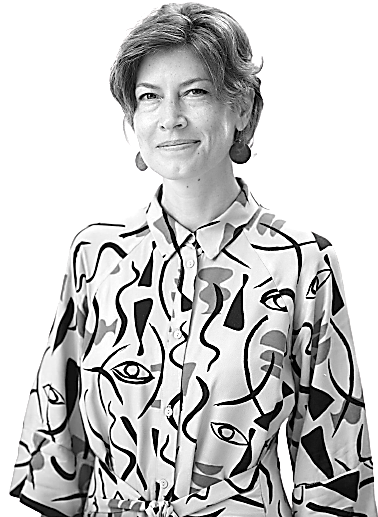
Institutionalizing Interdisciplinarity in the Contemporary University: An Interview with Christy Wampole

This is part of our Campus Spotlight on Princeton University.
In this interview, Christy Wampole discusses Princeton University’s Interdisciplinary Doctoral Program in the Humanities (IHUM). An Associate Professor of French and Italian with a focus on nineteenth–, twentieth–, and twenty-first century French, Francophone, and Italian Literature, Wampole is the current director of IHUM. She reflects on the program’s mission, its recent activities, and the understandings of “interdisciplinarity” shared by its members. The interview then turns to Wampole’s recently published book, Degenerative Realism: Novel and Nation in Twenty-First-Century France (2020), which serves as an excellent example of the type of interdisciplinary work being done in IHUM. Degenerative Realism charts the emergence of a new literary mode in France, one that homes in on a purported decline in the general conditions of French life. In the book, Wampole explores how contemporary French authors such as Michel Houellebecq, Frédéric Beigbeder, Aurélien Bellanger, Yann Moix, and others draw selectively on a range of academic disciplines (e.g., sociology, demography, economics, and history) to paint their dark portraits of national decline.
—Luke Forrester Johnson for EuropeNow
EuropeNow Last academic year, you became the director of Princeton’s Interdisciplinary Doctoral Program in the Humanities (IHUM). How would you describe the structure and the mission of IHUM?
Christy Wampole IHUM serves several purposes. First, it is a communal site for professors and students whose work cannot be contained by the strictures of a single academic discipline. Among the members of our group, we have poets, filmmakers, musicians, essayists, artists, an instrument builder, an architect—in short, people who are making objects and engaging with culture in a way that is not purely academic. IHUM is where praxis and theory meet, where members are encouraged to think of their work from the perspective of scholar and maker. On a more practical front, IHUM offers graduate students a sixth year of funding, support for research, reading groups, and conference sponsorship, and a chance to workshop their intellectual and creative projects that could not be easily workshopped in their home departments. Members also meet students and faculty from other disciplines and have a chance to welcome outside scholars, artists, and creative people who visit us and share their current projects.
EuropeNow “Interdisciplinarity” is a notoriously vague term. Very often, it’s simply thrown around as a buzz word. Do you think the IHUM program has a distinct vision of what it means to be “interdisciplinary?”
Christy Wampole It’s true that interdisciplinarity has been a buzzword in academia for at least fifteen years or so, and yes, it can mean almost anything. The summer before I took on the directorship in Fall of 2020, I did a listening tour, meeting with every Executive Committee member and current IHUM student who could spare the time, asking precisely how they understand the notion of interdisciplinarity within the framework of our program. I’d say I met with at least twenty members and got twenty different answers. At first, I was frustrated by the lack of cohesion between what various people saw as IHUM’s purpose, but then I reconsidered. Why can’t interdisciplinarity mean something different for each person who is a part of IHUM? We have some members who feel limited creatively in their home departments, so for them, IHUM is an outlet for that pent-up creativity. For others, it is a place to absorb theories from other disciplines. Some want to write for wider audiences and use IHUM as a place to learn to talk to people who don’t know the jargon of their field. Some have used IHUM’s resources to learn a new language or new techniques of forensic analysis, how to code, edit a documentary, work with rare manuscripts, conduct interviews, or write autobiographically about the themes they’re exploring in their dissertations. What is better than a program that makes all of those things possible, all the while letting you meet some of the most unconventional and imaginative people on campus?
EuropeNow Do you have a favorite example of an IHUM project, talk, or discussion? Something that you think nicely captures—or at least taps into—the mission behind the program?
Christy Wampole I enjoy when graduate students use their workshops to blur the line between academic and creative practices. To give a recent example, Jon Catlin (History) shared a memoir he is writing that channels concepts from trauma studies and the notion of catastrophe—the topic of his dissertation—into a series of reflections on his childhood in a troubled home. I wish more scholars could find ways to connect their academic work with the “real world,” which seems at times so far removed from our concerns at the university. We’ve also had some remarkable events from outside guests in the last two years. There are two that stand out most in my mind. The first is the 2021 Faber Lecture delivered by artist Cameron Rowland titled “Encumbrance.” He spoke to us about a recent conceptual project that explored the themes of reparation, property, and colonial violence using mahogany elements of the Institute of Contemporary Arts building in London as objects for conducting a thought experiment of sorts. The mahogany used to make these architectural elements—the doors and handrail—came from British colonies and were felled by enslaved people. Rowland’s experiment asked us to consider who should be the beneficiaries of the value accumulated by these objects over time.
The second event that made an impression on me was our most recent one—a virtual visit by the Afghan artist Kubra Khademi, who is living in exile in Paris after her 2015 artwork “Armor” led to death threats against her. The theme for this year’s IHUM speaker series is “home,” a concept, the students noted in their abstract on the theme, that has been greatly troubled by the pandemic and by various political developments since 2016. Kubra showed us her most recent pieces, which place women, female children, and animals in the same category as domestic chattel in the oppressive world ruled by the Taliban regime. She spoke at length about the matriarchal lineage of her family, about exile and the moment in 2015 when she followed the footsteps of Walter Benjamin toward the town Portbou in Spain where he took his own life, and about her reaction to the American withdrawal from Afghanistan. She has been frantically trying to help evacuate artists—particularly female artists—who are likely to be murdered by the Taliban. To have had the chance to speak with someone for whom artmaking is a matter of life and death was quite moving.
EuropeNow You’ve recently published a book called Degenerative Realism: Novel and Nation in Twenty-First Century France, which explores contemporary French literature through a number of other disciplines. What is it about?
Christy Wampole For many French novelists writing now—Michel Houellebecq, Frédéric Beigbeder, and Yann Moix are among the most well-known—there is a pervasive sense that France, Europe, and the West are rotting entities. To make their claims, they look toward sociology, demography, economics, the histories of religion and technology, or simply the alarming stories brought to us by journalistic outlets on or offline. Based on somewhat skewed evidence gleaned from these sources, they write novels that depict the collective worsening of life. These impassive books don’t seem to believe that recovery is possible. They instead describe a process of degeneration, a “fall from ancestral quality,” to quote one of the early meanings of the word. Clearly, the quickly shifting ways we now tend to think about race, gender, social class, and empire has fed these narratives, usually told by or featuring protagonists who see no benefits for themselves in the new trends in identity consciousness. On the contrary, they imagine themselves to be losers in this new age, when perceived dangers like feminism, globalization, radical Islam, and capitalism permanently alter what is doable and sayable in a world that barely resembles the one from a near past.
What interests me about these novels is, first and foremost, the sense of alienation they communicate. I feel as alienated lately as the protagonists do, albeit for very different reasons. How is it possible that the characters—whose politics, social life, and tastes are more or less the opposite of my own—still manage to convey a feeling that is familiar to me and perhaps to most people living today? This estrangement, whether it is felt by a person of the left or the right, or by an apolitical person, is, strangely, something we all have in common. That, in my view, is the real aesthetic potential of these books: that they have preserved a collective mood that I believe will have been the prevailing one of our age.
EuropeNow One of the themes you come back to throughout the book is the authors’ ambivalent relationships to ideology, particularly that of Michel Houellebecq, whose dark, cynical novels are well known for sparking controversy in France around race, gender, Islam, and immigration.
Although some critics have argued that these authors traffic in far-right ideology, there are also those who think of them as provocative satirists—offensive, to be sure, but sincere demagogues, not so much. You write:
Throughout these novels we come across] facsimiles of the alarmist discourse so omnipresent in the contemporary French mediascape… [But while] these kinds of assertions pepper the fictions I’ve described throughout this book, they do not deliver the ideological sureness we’ve come to expect from the roman à thèse. They are not prescriptions but rather melancholic, descriptive time capsules in which the atmospherics of the moment remain preserved. Degenerative realist novels have moved beyond ideology toward resignation. (Wampole 2020, 166)
I’m curious about how you are thinking about ideology here. In a recent analysis of Trumpism, anthropologist William Mazzarella suggests that it is precisely Trump’s lack of sincerity, his lack of conviction, and the lack of any perfect match between political platform and political performance, that renders Trump so enjoyable for his supporters (here Mazzarella uses “enjoyable” in the Lacanian sense of jouissance). He suggests that the moments when Trump seems to depart most clearly from any coherent ideological program are precisely those when he’s most effective (or rather, the most affective). On this view, political power gains purchase through the repetition and proliferation of excitable speech, rather than the convincing delivery of semantic content as mentally registered by a deliberative political subject. In this regard, Houellebecq seems quite Trumpian to me. Does this seem like a useful way of thinking about ideology to you? Or do you think we ought to hew more closely to a view of ideology premised on sincerity and semantic content? Put another way, what do we gain—both intellectually and politically—by framing Houellebecq as a satirist, rather than a demagogue?
Christy Wampole Regarding ideology, I would say that Houellebecq’s approach is descriptive while Trump’s is prescriptive. Houellebecq, an observer of the world’s dysfunction, is far more intelligent and politically informed, someone who studies, reads and writes books, and has the patience and discipline to carry a project through to the end. He looks at the world and transcribes what he sees, even if the vision presented in his books is a subjective and selective one. Trump, on the other hand, wants to force the world into the strange shape of his sadistic, self-interested, incoherent ideology. Because he is part of the world of politics and not literature—can you even imagine a “literary Trump?”—he is not interested in giving an account of the world; he’s interested in forcing the world into a shape of his choosing. As far as I’m concerned, the two of them are from different planets. Trump is a comic actor, stirring the passions of his supporters with “excitable speech,” as you put it. Houellebecq’s gimmick is the blasé, the calm, cool, and detached. He is a misanthrope and a kind of Francophobe. He mocks Marine Le Pen as often as he does François Hollande and is an anti-nationalist, based on this argument: “Developing a sense of overweening national pride is always a sign, to my mind, that you have nothing much else to be proud of.” He also writes, “I have never felt any duty or responsibility toward France and choosing which country I live in has about as much emotional resonance for me as choosing which hotel I stay in.” Granted, I don’t think Trump cares one iota about the United States, but his fiery “Make America Great Again” slogan offers at least some kind of ideological framework with a prescriptive, action-oriented intention. In Houellebecq’s case, it is difficult to feel called to action by his novels, first, because the processes of political and social decay he describes are, in his own words, completely irreversible, and second, because description is not exactly an action-eliciting mode.
EuropeNow In her famous essay on paranoid and reparative reading, Eve Kosofsky Sedgwick argued that paranoia is a fundamentally mimetic affect. In her words, it “seems to grow like a crystal in a hypersaturated solution, blotting out any sense of the possibility of alternate ways of understanding or things to understand” (Sedgwick 2003, 131). In spending so much time reading the work of authors who many have described as paranoid, did you personally start to worry that you might become paranoid? I sometimes worry, for example, that if I spend too much time reading racist, misogynist texts in order to critique them, I might start becoming more racist and misogynist myself, despite my best intentions. Of course, one doesn’t just wake up one morning an accidental neo-Malthusian, but so much important critical thinking depends on the premise that power is always already operating through our thoughts, unbeknownst to us (you can guess which side of Sedgwick’s essay I come out on). In short, I’m wondering: when spending so much time reading texts you disagree with, how do you stay grounded?
Christy Wampole I don’t worry about this in my own case. I feel quite immune to the power of suggestion, be it in the form of advertising, hypnosis, propaganda, or the reading of troubling opinions. Perhaps I’m just too stubborn with my convictions, but as I read, I have never felt that my political opinions were being altered in any way. On the contrary, through the readings, I’ve better understood the metaphors reactionaries rely on to make their case, which makes it easier to counter them with better ones. There is, however, another risk to working on this kind of stuff. You risk becoming demoralized. I started writing Degenerative Realism just before the 2016 election, which means the book gestated during the Trump years, hardly a hospitable place for such a project in its embryonic phase. I would work on the book all day then turn on the news and feel nauseated by the symmetry. I encourage people not to be afraid to work on such material—fear, after all, is what the bad guys thrive on—but to counter the dark imagery you find there with more realistic renderings of the world, things that take into account new forms of beauty, the headway we’ve made on some of the most intractable problems, and the quiet, daily joys that are too unspectacular to make the news.
Christy Wampole is Associate Professor of French and Director of the Interdisciplinary Doctoral Program in the Humanities (IHUM) at Princeton University. She is the author of three books: Degenerative Realism: Novel and Nation in Twenty-First Century France (2020), Rootedness: The Ramifications of a Metaphor (2016), and The Other Serious: Essays for a New American Generation (2015). Her work has also been published in MLN, The Modern Language Review, The New York Times, The New Yorker, L’Esprit créateur, Small Axe, The French Review, Magazine littéraire, Quaderni del ‘900, and Yale French Studies.
Luke Forrester Johnson is a joint PhD candidate in anthropology and the interdisciplinary humanities at Princeton University and a visiting researcher at the Institut interdisciplinaire d’anthropologie du contemporain (IIAC) in Paris. Through an ethnography of interracial erotics among white and Black French people, his dissertation reevaluates the role of the psyche as a key analytic in the anthropology of sexuality. His work has also appeared in SubStance and Symplokē.
References
Mazzarella, William, Eric L. Santner, and Aaron Schuster. 2019. Sovereignty, Inc.: Three Inquiries in Politics & Enjoyment. Chicago: The University of Chicago Press.
Sedgwick, Eve. 2002. “Paranoid Reading, Reparative Reading, or, You’re So Paranoid, You Probably Think this Essay is about You.” In Touching Feeling. Durham: Duke University Press.
Wampole, Christy. 2020. Degenerative Realism: Novel and Nation in Twenty-First Century France. New York: Columbia University Press.




